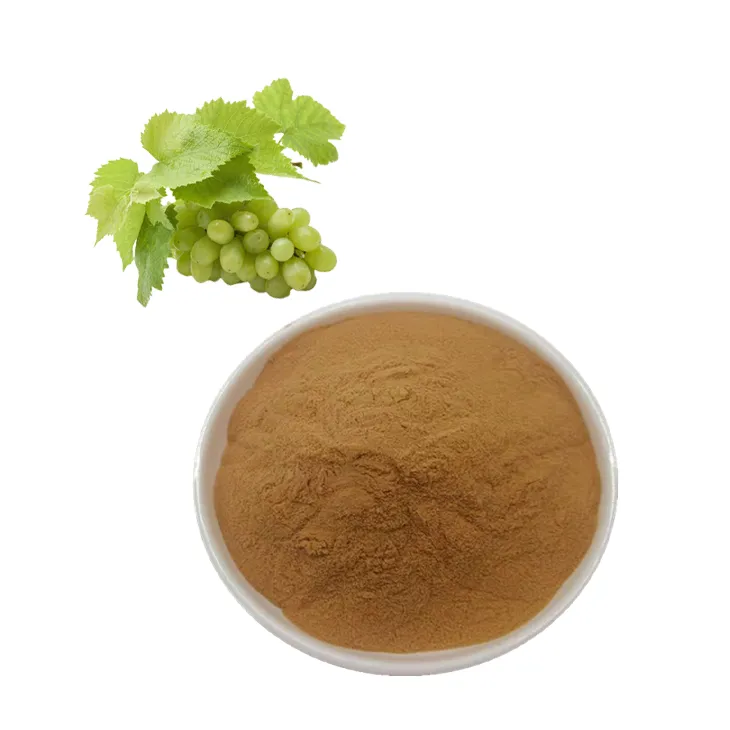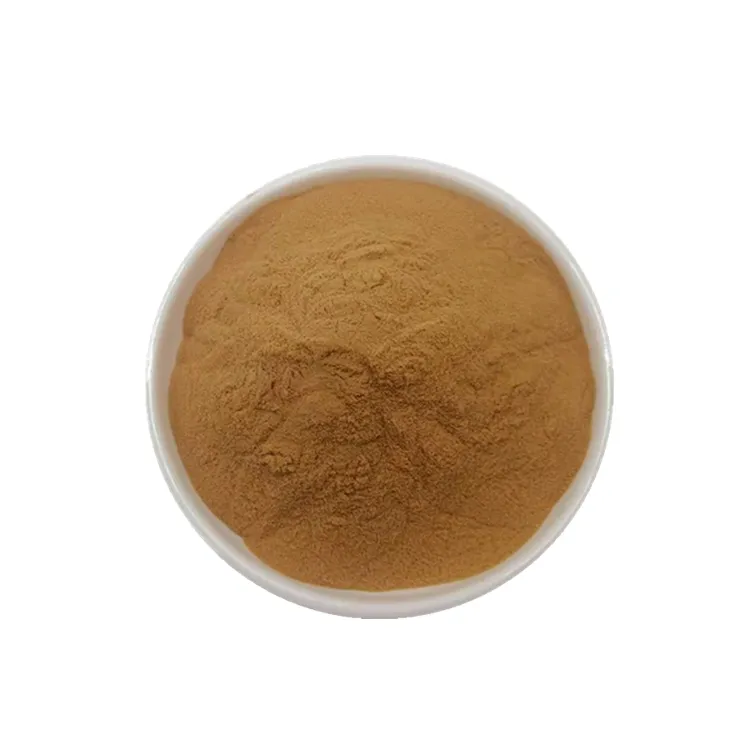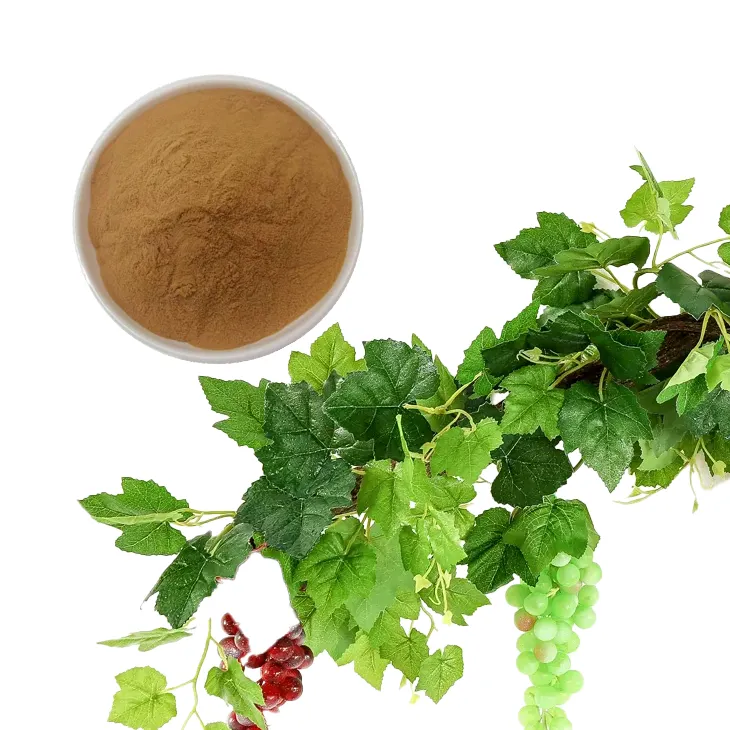- 0086-571-85302990
- sales@greenskybio.com
5 Great Reasons for Using Grape Leaf Extract in the Food Industry.
2024-12-12

1. Introduction
In recent years, the food industry has been constantly on the lookout for novel and natural ingredients that can enhance the quality, safety, and appeal of food products. Grape Leaf Extract has emerged as a promising candidate, with a wide range of potential applications. This extract, derived from the leaves of grapevines, offers several unique properties that make it highly valuable in the food industry.

2. Antioxidant Properties
Antioxidants play a crucial role in the food industry. One of the primary reasons for using Grape Leaf Extract in food is its strong antioxidant properties.
- Prevention of Food Spoilage: Oxidation is one of the main causes of food spoilage. Free radicals, which are highly reactive molecules, can initiate a series of chemical reactions in food that lead to rancidity, off - flavors, and a decrease in nutritional value. Grape Leaf Extract contains various antioxidant compounds, such as phenolic acids, flavonoids, and stilbenes. These compounds can scavenge free radicals, thereby inhibiting the oxidation process. For example, in oils and fats, which are highly susceptible to oxidation, the addition of grape leaf extract can significantly delay the onset of rancidity. This is especially important for products with a long shelf life, such as some packaged snacks and cooking oils.
- Extension of Shelf Life: By preventing oxidation, grape leaf extract helps to extend the shelf life of food products. This not only reduces food waste but also allows manufacturers to distribute their products over a wider geographical area and for a longer period. For perishable items like fresh - cut fruits and vegetables, the antioxidant activity of grape leaf extract can slow down the deterioration process, maintaining the freshness and quality of the produce for a longer time. In the case of processed meats, it can prevent the development of discoloration and off - odors, ensuring that the products remain appealing to consumers throughout their shelf life.

3. Unique Flavor
Another significant advantage of grape leaf extract in the food industry is its unique flavor profile.
- Enhancement of Taste: The flavor of grape leaf extract can add a distinct and pleasant note to various food products. It has a slightly earthy, herbaceous, and subtly fruity flavor. In culinary applications, this can be used to enhance the taste of both savory and sweet dishes. For instance, in Mediterranean cuisine, grape leaves are often used to wrap and flavor various fillings, such as rice, meat, and vegetables. When the extract is used in a similar way, it imparts a characteristic flavor that is both familiar and novel. In the case of sauces, dressings, and marinades, the addition of grape leaf extract can provide an extra layer of complexity to the flavor profile, making the final product more interesting and appealing to the palate.
- Compatibility with Different Foods: Grape leaf extract has the ability to blend well with a wide range of ingredients. It can be used in combination with other herbs and spices without overpowering their flavors. This makes it a versatile ingredient in the creation of new and innovative food products. For example, in bakery products like bread and pastries, it can be added in small amounts to impart a unique flavor that complements the sweetness of the dough and other flavorings. In beverages, such as herbal teas or fruit - flavored drinks, it can add a refreshing and distinctive touch.

4. Nutrient - Rich
Grape leaf extract is a rich source of various nutrients, which is another reason for its growing popularity in the food industry.
- Vitamins and Minerals: It contains essential vitamins such as vitamin C, which is important for maintaining the immune system and promoting collagen synthesis in the body. Additionally, it may also contain minerals like potassium, which is crucial for heart health and proper muscle function. When added to food products, these nutrients can enhance the nutritional value of the final product. For example, in fortified cereals or energy bars, the addition of grape leaf extract can contribute to the overall nutrient profile, making the product more appealing to health - conscious consumers.
- Bioactive Compounds: The presence of bioactive compounds in grape leaf extract, such as polyphenols, offers additional health benefits. These compounds have been associated with anti - inflammatory, anti - cancer, and cardioprotective properties. When incorporated into food, they not only provide potential health benefits to consumers but also add value to the product. For instance, in functional foods or dietary supplements, grape leaf extract can be a key ingredient due to its rich content of bioactive compounds.
5. Antimicrobial Properties
Food safety is of utmost importance in the food industry, and grape leaf extract can contribute to this aspect through its antimicrobial properties.
- Inhibition of Microbial Growth: Grape leaf extract has been shown to possess antimicrobial activity against a variety of food - borne pathogens, such as bacteria, yeasts, and molds. The antimicrobial compounds present in the extract can disrupt the cell membranes of these microorganisms, inhibit their metabolic processes, or interfere with their DNA replication. This helps to prevent the growth and proliferation of harmful microbes in food. For example, in dairy products, the use of grape leaf extract can inhibit the growth of spoilage bacteria and pathogenic microorganisms, ensuring the safety and quality of the product.
- Reduction of Foodborne Illnesses: By controlling microbial growth, grape leaf extract can significantly reduce the risk of foodborne illnesses. This is particularly important for ready - to - eat foods, which are often consumed without further cooking. In the case of pre - packaged salads or deli meats, the addition of grape leaf extract can act as a natural preservative, safeguarding consumers from potential foodborne pathogens.
6. Natural Coloring Agent
With the increasing consumer demand for natural ingredients in food, grape leaf extract can serve as a natural coloring agent.
- Attractive Color: The extract can impart a natural and appealing color to food products. Depending on the extraction method and the variety of grapes used, the color can range from a light green to a deeper, more vibrant hue. This can be used to enhance the visual appeal of products such as candies, jellies, and beverages. For example, in green - colored beverages, the use of grape leaf extract can provide a more natural and healthy - looking color compared to artificial green dyes.
- Meeting Consumer Preferences: Consumers are increasingly seeking products that are free from artificial colors. Grape leaf extract as a natural coloring agent can meet this demand, making food products more marketable. In addition, it can also be used in combination with other natural colorants to create a wider range of colors, providing more options for food manufacturers to develop visually appealing products.
7. Conclusion
In conclusion, grape leaf extract offers numerous benefits for the food industry. Its antioxidant properties help prevent food spoilage and extend shelf life, its unique flavor enhances the taste of food, its nutrient - rich composition adds value to food products, its antimicrobial properties ensure food safety, and it can be used as a natural coloring agent to meet consumer preferences. As the food industry continues to evolve and consumers demand more natural and high - quality products, grape leaf extract is likely to play an increasingly important role in the development of new and improved food items.
FAQ:
Q1: How does the antioxidant property of grape leaf extract help in the food industry?
Antioxidants in grape leaf extract prevent the oxidation of fats and oils in food. Oxidation can lead to rancidity and spoilage. By inhibiting this process, the extract can keep food fresh for a longer time, thus extending the shelf life of various food products like oils, nuts, and processed meats.
Q2: Can you give some examples of how grape leaf extract enhances the flavor of food?
Grape leaf extract has a slightly earthy and herbaceous flavor. In dishes like salads, it can add a unique depth of flavor. When used in meat marinades, it imparts a subtle complexity that complements the savory taste of the meat. It can also enhance the flavor of cheese by providing a fresh, natural undertone.
Q3: What specific nutrients are found in grape leaf extract that add value to food?
Grape leaf extract contains vitamins such as vitamin C and vitamin K. It also has minerals like potassium and magnesium. These nutrients are beneficial for consumers' health. When added to food, they not only enhance the nutritional profile but also can be a selling point for health - conscious consumers.
Q4: How effective are the antimicrobial properties of grape leaf extract in ensuring food safety?
The antimicrobial properties of grape leaf extract can inhibit the growth of various harmful microorganisms such as bacteria, yeast, and molds. In food products, this helps to prevent the growth of pathogens that can cause foodborne illnesses. For example, in ready - to - eat foods like sandwiches or salads, it can act as a natural preservative to keep the food safe for consumption.
Q5: What makes grape leaf extract a suitable natural coloring agent?
Grape leaf extract has a natural green color. This color can be used to tint foods like beverages, candies, or baked goods. It provides a natural alternative to synthetic colorants, which are often associated with potential health risks. Moreover, the color from grape leaf extract is stable under certain processing conditions, making it a reliable option for coloring food.
Q6: Are there any potential drawbacks to using grape leaf extract in the food industry?
One potential drawback could be cost. Extracting and purifying grape leaf extract may be more expensive compared to some synthetic alternatives. Also, the availability of high - quality grape leaf extract may be limited depending on the season and source. Additionally, there may be some variability in the potency and composition of the extract, which could pose challenges in standardizing its use in food products.
Related literature
- The Role of Grape Leaf Extract in Food Preservation"
- "Nutritional Benefits of Grape Leaf Extract in Food"
- "Antimicrobial and Antioxidant Properties of Grape - derived Extracts in the Food Chain"
- ▶ Hesperidin
- ▶ citrus bioflavonoids
- ▶ plant extract
- ▶ lycopene
- ▶ Diosmin
- ▶ Grape seed extract
- ▶ Sea buckthorn Juice Powder
- ▶ Beetroot powder
- ▶ Hops Extract
- ▶ Artichoke Extract
- ▶ Reishi mushroom extract
- ▶ Astaxanthin
- ▶ Green Tea Extract
- ▶ Curcumin Extract
- ▶ Horse Chestnut Extract
- ▶ Other Problems
- ▶ Boswellia Serrata Extract
- ▶ Resveratrol Extract
- ▶ Marigold Extract
- ▶ Grape Leaf Extract
- ▶ blog3
- ▶ blog4
- ▶ blog5
-
Buckthorn bark extract
2024-12-12
-
Cocoa Extract
2024-12-12
-
Acai Berry Extract
2024-12-12
-
Hericium erinaceus extract powder
2024-12-12
-
Peppermint Oil
2024-12-12
-
Alisma Extract
2024-12-12
-
Natural grape seed extract
2024-12-12
-
Red Date Extract
2024-12-12
-
Beetroot juice Powder
2024-12-12
-
Genistein
2024-12-12





















